Search the Special Collections and Archives Portal
Search Results
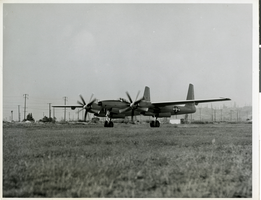
Photograph of the XF-11 as it is about to take off for its first test flight in Culver City, California July 7, 1947
Date
1947
Archival Collection
Description
Transcribed from attachment to photo: "NEW LONG-RANGE PLANE ANNOUNCED CULVER CITY, CALIF., The FX-11 took off today on its first test flight. One of the world's fastest long-range photographic planes, it was designed and built by Howard Hughes in conjunction with Air Materiel Command engineers. It has a wing spread of 101 feet, 4 inches, and is powered by two 3000-horsepower radial engines with eight-bladed contra-rotating propellers. Army officials said it can attain a speed of more than 400 miles per hour and has a ceiling of more than 40,000 feet." Transcribed from photo sleeve: "Howard Hughes sits in the cockpit of the XF-11, a reconnaissance plane that Hughes built and designed in conjunction with Air Materiel Command engineers. Hughes is preparing for his first test flight in Culver City, California July 7, 1947."
Image
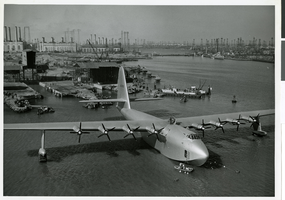
Aerial view of Hughes Flying boat launched, November 1, 1947, in preparation for the historic test flight, November 2 , 1947
Date
1947-11-01
Archival Collection
Description
Aerial view of Hughes Flying boat. Press release attached to back of photo: "LAUNCHING WORLD'S LARGEST PLANE The Hughes Flying boat was launched for the first time November 1, 1947. After the three concrete docks, one containing the hull and two the wing pontoons, were pumped with sea water to the outside level, gates were lowered and the Flying Boat was carefully towed forward by tractors, and by boats as the tail cleared the dock. During taxi tests the following day Howard Hughes made a surprise flight of a mile." Stamped on back of photo: "Hughes Aircraft Photo" and the date "Nov 1 1947." Los Angeles Harbor, Terminal Island are now known as Long Beach.
Image
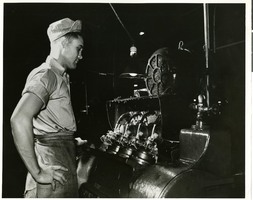
Photograph of a man working on rock bit drilling pieces at the Hughes Tool Co., Houston, Texas, circa 1950s
Date
1950 to 1959
Archival Collection
Description
Transcribed from attached press release: "HUGHES ROCK BIT PRODUCTION more than 500,000 rock bits produced last year by the Hughes Tool Company, Houston, Texas, for drilling the kind of deep wells which now produce 90 per cent of the world's petroleum. The rock bit was invented by Howard Hughes' father and the resulting business became the cornerstone on which Howard Hughes built his industrial empire. The machinist above is performing an operation on the cones which make up the rotating end of the Hughes rock bit." Transcribed from photo sleeve: "The Kearney and Trecker 4 spindle machine at the Hughes Tool Company in Houston, Texas. Ca. 1950s."
Image
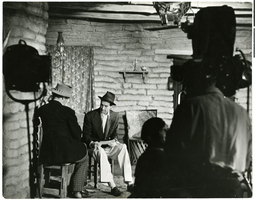
Photograph of Howard Hughes with Walter Huston on the set of The Outlaw, Hollywood, circa 1941
Date
1941
Archival Collection
Description
Howard Hughes on a motion picture set supervising the 'dressing' of a set for use in his production of "The Outlaw." Transcribed from attached press release: "From Russell Birdwell and Associates After an absence of ten years from motion picture production, Howard Hughes resumes film making with the producing and directing of "The Outlaw," the story of Billy the Kid, for Twentieth Century-Fox release. In 1931 he produced and directed "Hell's Angels," from which emerged a glorious new star, Jean Harlow, and in the same year he brought to stardom Paul Muni in "Scarface." And now Hughes, who in 1931 promised two new stars in Harlow and Muni, makes the same promise again with 19-+year old Jane Russell and 21-year old Jack Buetel, playing the top leads in "The Outlaw," the cast of which also includes Thomas Mitchell and Walter Huston. In this picture Hughes is discussing a story point with Jules Furthman, author of the story and screen play on "The Outlaw."
Image
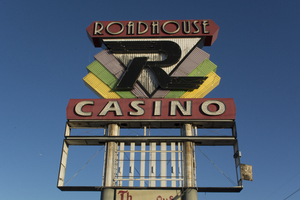
Photographs of Roadhouse Casino sign, Las Vegas (Nev.), March 14, 2017
Date
2017-03-14
2017-09-01
Archival Collection
Description
The Roadhouse Casino sign sits unlit at 2100 North Boulder Highway. Information about the sign is available in the Southern Nevada Neon Survey Data Sheet.
Site address: 2100 N Boulder Hwy
Sign owner: Robert McMackin
Sign details: Roadhouse approved for gaming 1988, Robert McMackin bought the Roadhouse 1992, but it closed 2002. They planned to refurbish and reopen by 2010 but has been in legal trouble and has not reopened.
Sign condition: 2- reader board portion/plastic back lit portion is gone and paint has faded drastically
Sign form: Pylon
Sign-specific description: Big Letters on top "Roadhouse" below Is a Huge Letter "R". Still up but in horrible condition. Reader board is a frame and appears to be scrapped. No upkeep has been made to the sign. There is an array of colors behind the 'R' such as purple, white, yellow and green in a parallel plume shape.
Sign - type of display: Neon
Sign - media: Steel
Sign - non-neon treatments: There must have been plastic on this sign since there is a sign box that would contain it.
Sign environment: This location is on Boulder Hwy. near Sunset Road.
Sign - thematic influences: The letter R in the middle of the sign is remnant of the 1980's car/video game font.
Survey - research locations: Las Vegas Sun Article synopsis https://vegasinc.lasvegassun.com/business/legal/2012/mar/26/city-henderson-reverses-course-roadhouse-casino-li/ Review Journal article https://www.reviewjournal.com/business/casinos-gaming/station-casinos-henderson-settle-roadhouse-dispute/
Survey - research notes: The articles were helpful with finding information on this property since other avenues did not have any information on it.
Surveyor: Wyatt Currie-Diamond
Survey - date completed: 2017-09-01
Sign keywords: Pylon; Neon; Steel; Plastic; Incandescent; Backlit; Back to back
Site address: 2100 N Boulder Hwy
Sign owner: Robert McMackin
Sign details: Roadhouse approved for gaming 1988, Robert McMackin bought the Roadhouse 1992, but it closed 2002. They planned to refurbish and reopen by 2010 but has been in legal trouble and has not reopened.
Sign condition: 2- reader board portion/plastic back lit portion is gone and paint has faded drastically
Sign form: Pylon
Sign-specific description: Big Letters on top "Roadhouse" below Is a Huge Letter "R". Still up but in horrible condition. Reader board is a frame and appears to be scrapped. No upkeep has been made to the sign. There is an array of colors behind the 'R' such as purple, white, yellow and green in a parallel plume shape.
Sign - type of display: Neon
Sign - media: Steel
Sign - non-neon treatments: There must have been plastic on this sign since there is a sign box that would contain it.
Sign environment: This location is on Boulder Hwy. near Sunset Road.
Sign - thematic influences: The letter R in the middle of the sign is remnant of the 1980's car/video game font.
Survey - research locations: Las Vegas Sun Article synopsis https://vegasinc.lasvegassun.com/business/legal/2012/mar/26/city-henderson-reverses-course-roadhouse-casino-li/ Review Journal article https://www.reviewjournal.com/business/casinos-gaming/station-casinos-henderson-settle-roadhouse-dispute/
Survey - research notes: The articles were helpful with finding information on this property since other avenues did not have any information on it.
Surveyor: Wyatt Currie-Diamond
Survey - date completed: 2017-09-01
Sign keywords: Pylon; Neon; Steel; Plastic; Incandescent; Backlit; Back to back
Mixed Content
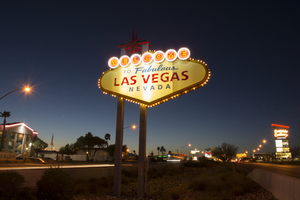
Photographs of "Welcome to Fabulous Las Vegas" sign replica, Las Vegas (Nev.), March 14, 2017
Date
2017-03-14
2017-09-28
Archival Collection
Description
A replica of the "Welcome to Fabulous Las Vegas" sign sits at a median near Boulder Highway at dusk. Information about the sign is available in the Southern Nevada Neon Survey Data Sheet.
Site address: Boulder Hwy
Sign owner: Commissioned by the Boulder Hwy casinos
Sign details: This sign is to pay homage to the original 1959 Welcome to Fabulous Las Vegas sign, but to honor the "Boulder Strip". There are many casinos within this area of Boulder Hwy similar to our famous Las Vegas Blvd. sign.
Sign condition: 5- Very good condition and still works very good
Sign form: Pylon
Sign-specific description: This sign is a replica of the current Welcome to Fabulous Las Vegas sign with identical design and materials used, but is just smaller than the real one
Sign - type of display: Neon, plastic back lit portion and incandescent light bulbs
Sign - media: Steel and plastic
Sign - non-neon treatments: Incandescent light bulbs and plastic back lit portion
Sign animation: Chasing
Notes: incandescent light bulbs on the exterior of the sign.
Sign environment: In the middle of the median on Boulder Hwy. In the middle of the road in front of the East side Cannery and close to the Longhorn casino as well.
Sign designer: Betty Willis
Sign - date of installation: 2007
Sign - thematic influences: Identical in design of the Welcome to Fabulous Las Vegas sign but a bit smaller.
Sign - artistic significance: Googie style is portrayed in the design of this sign.
Survey - research locations: Google maps roadside view, Sign website discussing welc. To fab L.V. sign in general and year of replica installation https://www.signs.com/blog/15-surprising-facts-about-the-las-vegas-sign/ , Las Vegas Sun article https://lasvegassun.com/news/2008/nov/25/ask-mr-sun/
Surveyor: Emily Fellmer
Survey - date completed: 2017-09-28
Sign keywords: Pylon; Neon; Plastic; Backlit; Incandescent; Chasing; Steel
Site address: Boulder Hwy
Sign owner: Commissioned by the Boulder Hwy casinos
Sign details: This sign is to pay homage to the original 1959 Welcome to Fabulous Las Vegas sign, but to honor the "Boulder Strip". There are many casinos within this area of Boulder Hwy similar to our famous Las Vegas Blvd. sign.
Sign condition: 5- Very good condition and still works very good
Sign form: Pylon
Sign-specific description: This sign is a replica of the current Welcome to Fabulous Las Vegas sign with identical design and materials used, but is just smaller than the real one
Sign - type of display: Neon, plastic back lit portion and incandescent light bulbs
Sign - media: Steel and plastic
Sign - non-neon treatments: Incandescent light bulbs and plastic back lit portion
Sign animation: Chasing
Notes: incandescent light bulbs on the exterior of the sign.
Sign environment: In the middle of the median on Boulder Hwy. In the middle of the road in front of the East side Cannery and close to the Longhorn casino as well.
Sign designer: Betty Willis
Sign - date of installation: 2007
Sign - thematic influences: Identical in design of the Welcome to Fabulous Las Vegas sign but a bit smaller.
Sign - artistic significance: Googie style is portrayed in the design of this sign.
Survey - research locations: Google maps roadside view, Sign website discussing welc. To fab L.V. sign in general and year of replica installation https://www.signs.com/blog/15-surprising-facts-about-the-las-vegas-sign/ , Las Vegas Sun article https://lasvegassun.com/news/2008/nov/25/ask-mr-sun/
Surveyor: Emily Fellmer
Survey - date completed: 2017-09-28
Sign keywords: Pylon; Neon; Plastic; Backlit; Incandescent; Chasing; Steel
Mixed Content
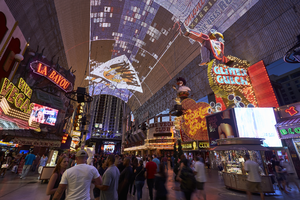
Photographs of La Bayou Casino, Las Vegas (Nev.), June 24, 2016
Date
2016-06-24 to 2017-09-08
Archival Collection
Description
The permanently closed Labayou Casino sits at 15 Fremont Street at the Fremont Street Experience. Information about the sign is available in the Southern Nevada Neon Survery Data Sheet.
Site address: 15 Fremont St
Sign owner: Derek Stevens
Sign details: Opened 1920 as Northern Club By Mayme Stocker. 1943-1960 operated as a few different businesses. 1970 opened as The Coin Castle, 1999 was renovated and opened as La Bayou, 2016 bought by Derek Stevens and torn down.
Sign condition: No longer there
Sign form: Architectural sign
Sign-specific description: Three neon signs site on top of a shack made of wood and sheet metal that is meant to represent something that might be seen in Louisiana. Two windows with green shutters are "open" with T.V. screens inside. Two neon signs sit at the top of the shack that spell out La Bayou in red neon and the cabinet is trimmed with purple neon. At the front of the property, above the entry, is a red neon sign that says "26 New Orleans Daiquiris."
Sign - type of display: Neon and incandescent
Sign - media: Steel, fiberglass
Sign environment: Part of the Fremont Street Experience, next to Golden Gate Casino
Sign - date of installation: c. 1999
Sign - thematic influences: The property has a theme element, which was popular of casinos of Las Vegas in the 1990s.
Sign - artistic significance: Property was decorated with a Louisiana inspired bayou, swamp motif.
Survey - research locations: Newspapers
Survey - research notes: https://www.reviewjournal.com/business/casinos-gaming/mermaids-la-bayou-and-glitter-gulch-come-to-a-close-on-fremont-photos/ https://lasvegassun.com/news/2016/jun/25/patrons-say-farewell-to-mermaids-and-la-bayou-in-d/ http://classiclasvegas.squarespace.com/downtown-history/?currentPage=3
Survey - other remarks: Property was razed 2016
Surveyor: Wyatt Currie-Diamond
Survey - date completed: 2017-09-08
Sign keywords: Architectural; Neon; Incandescent; Steel; Fiberglass
Site address: 15 Fremont St
Sign owner: Derek Stevens
Sign details: Opened 1920 as Northern Club By Mayme Stocker. 1943-1960 operated as a few different businesses. 1970 opened as The Coin Castle, 1999 was renovated and opened as La Bayou, 2016 bought by Derek Stevens and torn down.
Sign condition: No longer there
Sign form: Architectural sign
Sign-specific description: Three neon signs site on top of a shack made of wood and sheet metal that is meant to represent something that might be seen in Louisiana. Two windows with green shutters are "open" with T.V. screens inside. Two neon signs sit at the top of the shack that spell out La Bayou in red neon and the cabinet is trimmed with purple neon. At the front of the property, above the entry, is a red neon sign that says "26 New Orleans Daiquiris."
Sign - type of display: Neon and incandescent
Sign - media: Steel, fiberglass
Sign environment: Part of the Fremont Street Experience, next to Golden Gate Casino
Sign - date of installation: c. 1999
Sign - thematic influences: The property has a theme element, which was popular of casinos of Las Vegas in the 1990s.
Sign - artistic significance: Property was decorated with a Louisiana inspired bayou, swamp motif.
Survey - research locations: Newspapers
Survey - research notes: https://www.reviewjournal.com/business/casinos-gaming/mermaids-la-bayou-and-glitter-gulch-come-to-a-close-on-fremont-photos/ https://lasvegassun.com/news/2016/jun/25/patrons-say-farewell-to-mermaids-and-la-bayou-in-d/ http://classiclasvegas.squarespace.com/downtown-history/?currentPage=3
Survey - other remarks: Property was razed 2016
Surveyor: Wyatt Currie-Diamond
Survey - date completed: 2017-09-08
Sign keywords: Architectural; Neon; Incandescent; Steel; Fiberglass
Mixed Content
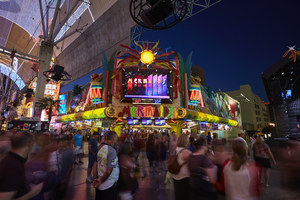
Photographs of Mermaids Casino signs, Las Vegas (Nev.), June 24, 2016
Date
2016-06-24
2016-09-09
Archival Collection
Description
The now permanently closed Mermaids Casino sits at 32 Fremont Street at the Fremont Street Experience. Information about the sign is available in the Southern Nevada Neon Survery Data Sheet.
Site address: 32 Fremont St
Sign owner: Derek and Greg Stevens
Sign details: Shutdown in 2016, opened briefly June 28th, 2017 for 8 hours to abide by gambling license law, was torn down shortly after. 2.76 acre lot, originally built in 1949.
Sign condition: Signage was removed from building during deconstruction
Sign form: Decorated shed
Sign-specific description: Covering all the sides of the Mermaids facing Fremont street, gives the feel of New Orleans during Mardi Gras with its bright vibrant colors, drums, maracas, and other items. Skeleton neon was used to accentuate features of the sign like details in the drums, outlining the word "Mermaids", and a good portion of the sign was internally lit as well. Giant TV screen hung in the middle at the corner of the building, giant Sun shaped pinata thing above the TV screen adding more to the theme.
Sign - type of display: Neon, LED screen
Sign - media: Steel and fiberglass
Sign - non-neon treatments: LED screen
Sign animation: Animated with an LED TV screen and some neon would flash on and off
Sign environment: Downtown on Fremont Street, part of the Experience. Surrounded by other casinos and gift stores.
Sign - date of installation: c. 1999
Sign - date of redesign/move: Torn down Summer 2017
Sign - thematic influences: Southern party themed, Mardi Gras.
Sign - artistic significance: American South and Mardi Gras.
Survey - research locations: Vital Vegas, Assessor's website
Surveyor: Danny Jacobs
Survey - date completed: 2017-09-09
Sign keywords: Neon; Steel; Fiberglass; Flashing; Video screen; Sculptural
Site address: 32 Fremont St
Sign owner: Derek and Greg Stevens
Sign details: Shutdown in 2016, opened briefly June 28th, 2017 for 8 hours to abide by gambling license law, was torn down shortly after. 2.76 acre lot, originally built in 1949.
Sign condition: Signage was removed from building during deconstruction
Sign form: Decorated shed
Sign-specific description: Covering all the sides of the Mermaids facing Fremont street, gives the feel of New Orleans during Mardi Gras with its bright vibrant colors, drums, maracas, and other items. Skeleton neon was used to accentuate features of the sign like details in the drums, outlining the word "Mermaids", and a good portion of the sign was internally lit as well. Giant TV screen hung in the middle at the corner of the building, giant Sun shaped pinata thing above the TV screen adding more to the theme.
Sign - type of display: Neon, LED screen
Sign - media: Steel and fiberglass
Sign - non-neon treatments: LED screen
Sign animation: Animated with an LED TV screen and some neon would flash on and off
Sign environment: Downtown on Fremont Street, part of the Experience. Surrounded by other casinos and gift stores.
Sign - date of installation: c. 1999
Sign - date of redesign/move: Torn down Summer 2017
Sign - thematic influences: Southern party themed, Mardi Gras.
Sign - artistic significance: American South and Mardi Gras.
Survey - research locations: Vital Vegas, Assessor's website
Surveyor: Danny Jacobs
Survey - date completed: 2017-09-09
Sign keywords: Neon; Steel; Fiberglass; Flashing; Video screen; Sculptural
Mixed Content
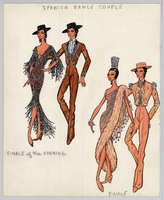
Costume design drawing, Spanish dance couples, Las Vegas, circa 1970s
Date
1970 to 1979
Archival Collection
Description
Costume Details: Two couples in rust and peach-colored flamenco costumes. Women are in beaded long silk dresses, men in boleros trimmed with jewels, frilled shirts and high-waisted trousers; one woman has fox fur trim on her dress and is wearing a tiara-type headpiece, all the others are wearing felt hats. Notations on back of sketch: "Danseurs Espagnols. Opening: Femme - Robe en faille recouverte en strass, chapeau et boucles d'orielles. Homme - Pantalon et gilets alpaga marron, chemise avec jabot dentelle. Reuers veste et garniture en strass - chapeau feutre. Finale: Robe en satin brodee de strass - Renard beige - boucles - peignes - bracelets - et boules pendantes en strass. Boy: Pantalon en alpaga - gilet satin - garnitures en strass - chapeau beige feutre."
Show Name: Casino de Paris
Performance Name: Finale
Site Name: Dunes (hotel and casino)
Show Name: Casino de Paris
Performance Name: Finale
Site Name: Dunes (hotel and casino)
Image
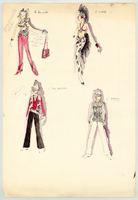
Costume design drawing, four Pony Express costume sketches, Las Vegas, January 28, 1968
Date
1968-01-28
Archival Collection
Description
Costume Details: Showgirl in sleeveless vest in spotted-pony print with fringe across chest, red tights with spotted-pony print pockets, pony print cuffs, red cowboy boots with spurs, holster with gun around hips, white hat, red bag marked "Pony Express"; topless showgirl in spotted-pony print tights with red jewelled belt, red harness, red side-blinders, matching headpiece, feathered black "tail", headpiece with black feather "mane"; male cowboy costume of black trousers, white boots, red shirt with white bandana tied around the neck, spotted-pony print sleeveless vest, holster and gun around the hips; male Civil War era costume with kepi-style cap, trousers with side fringe, fringed long sleeved jacket tied at the waist with fringed sash.
Show Name: Pony Express
Site Name: Sahara Hotel and Casino
Show Name: Pony Express
Site Name: Sahara Hotel and Casino
Image
Pagination
Refine my results
Content Type
Creator or Contributor
Subject
Archival Collection
Digital Project
Resource Type
Year
Material Type
Place
Language
Records Classification
